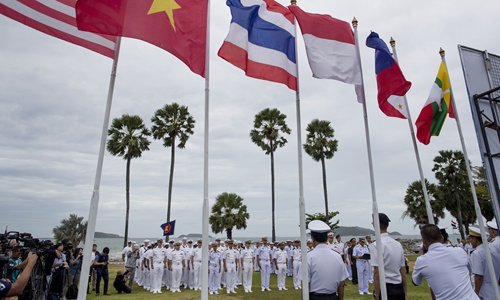HOME >> OPINION
ASEAN war games with US meant to promote centrality of bloc in the region
By Ge Hongliang Source:Global Times Published: 2019/9/4 19:53:40

Officers from US Navy and maritime forces from Association of Southeast Asian Nations (ASEAN) member states participate in the opening ceremony for the ASEAN-US Maritime Exercise at Sattahip Naval Base, Chonburi province, Thailand on Monday. Photo: IC
After holding two joint maritime exercises with China in October 2018 and April 2019, ASEAN members launched their first joint maritime war games with the US from Monday to Friday at a naval base in Chonburi province, east of Bangkok, Thailand.
Unlike the China-ASEAN joint maritime exercises, in which both sides emphasized jointly maintaining maritime security and combating non-conventional maritime security threats like the piracy problem, the US-ASEAN joint maritime exercise shows different expectations by the US and ASEAN.
US Indo-Pacific Strategy acts like the guiding light for Washington to promote US-ASEAN joint maritime exercise. Commander of US Indo-Pacific Command Admiral Philip Davidson on March 7 reiterated the importance of "ensuring a free and open Indo-Pacific" at the Fullerton Lecture hosted by the International Institute for Strategic Studies. According to a statement by US embassy in Bangkok, the maritime exercise is to "maintain maritime security, focus on prevention and pre-empt wrongdoing in the sea." The joint exercise is mostly held off the coast of Vietnam's Ca Mau province, where the US Navy will deploy "suspicious boats" in a mock exercise that will help its ASEAN counterparts search, verify, and prosecute the boats.
US Secretary of State Mike Pompeo attended a regional summit in August with the 10-country ASEAN in a bid to promote the Trump administration's Indo-Pacific Strategy. The joint maritime exercise is apparently organized as part of the US Indo-Pacific Strategy to promote military cooperation between the two sides. In the opinion of American and some Southeast Asian media outlets, the US-ASEAN joint maritime exercise is being held amid tensions between China and some bloc countries, especially Vietnam, due to sovereignty claims in the South China Sea. It is clearly aimed at containing China although it is not reported so. The "prevention and pre-empt wrongdoing" is in fact aimed at China's increasing safeguard of its legal rights in the South China Sea.
For ASEAN, the joint maritime exercise with the US is another move to avoid being involved in competition between China and the US and to achieve centrality, which means the bloc acts as a regional leader in Southeast Asia, East Asia and Asia-Pacific.
ASEAN should "seek to retain its centrality and strengthen its role as the driving force in regional cooperation," according to a statement issued by ASEAN Secretariat on January 1, 2007. The term "ASEAN centrality" is included in the ASEAN Charter as "the primary driving force in its relations and cooperation with its external partners in a regional architecture that is open, transparent and inclusive."
Such being the case, the multilateral defense diplomacy led by ASEAN will soon become a touchstone of new multilateral defense diplomacy in Southeast Asia, East Asia and Asia-Pacific.
In recent years, China has developed rapidly. Amid the regional competition, that between China and the US is becoming more prominent, ASEAN members are facing the increasing pressure of picking sides and major power competition. To deal with such a situation and avoid pressures, ASEAN took the opportunity of joint maritime exercises with China and the US to gradually build a new systemized platform. The bloc's eight main partners of dialogue, including China, the US and Japan, are also the main participants in the joint maritime exercise for ASEAN. Therefore, in this sense, holding joint maritime exercises with major powers such as China and the US is an active move by the bloc to promote and consolidate its centrality in the region.
The author is a research fellow with the Charhar Institute and the College of ASEAN Studies at Guangxi University for Nationalities. opinion@globaltimes.com.cn
Posted in: ASIAN REVIEW